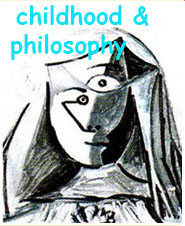da exclusão a um modelo identitário de inclusão: a deficiência como paradigma biopolítico
DOI:
https://doi.org/10.12957/childphilo.2017.23015Parole chiave:
biopolítica, inclusão, deficiência, resistência.Abstract
O deficiente tem sido objeto de exclusão no ambiente escolar. Historicamente, os argumentos utilizados para tal seriam os de que escaparia aos propósitos disciplinares da escola e, ao ser classificado como anormal, deveria ser destinado ao governo de outra instituição que, se não o corrigisse, o privaria da vida social. Recentemente, no caso do Brasil e de outros países, tais argumentos sofreram um deslocamento no sentido de buscar a inclusão do deficiente aos dispositivos e às instituições que os preparam para o exercício de uma função social e para o mercado. Nesse cenário atual, a categoria foucaultiana de biopolítica tem sido utilizada pela literatura acadêmica para elaborar um diagnóstico do papel ocupado pela deficiência tanto para problematizar as chamadas políticas de inclusão quanto para apresentar alternativas para o acolhimento dessa diferença ética em instituições como a escola. Desse ponto de vista, este artigo parte da constatação da necessidade de aprimorar a referida categoria, constitutiva de um diagnóstico mais amplo do presente e elaborada entre o final dos anos 1970 e meados dos anos 1980, recorrendo a outras publicações mais recentes do campo de estudos foucaultianos, para tornar seu uso um pouco mais preciso e para melhor focalizar o lugar ocupado pela deficiência no cenário biopolítico atual. Para tanto, recorremos aos estudos de Robert Castel, Paul Rabinow e Francisco Ortega para reelaborar o uso dessa categoria e atualizá-la em vistas a atender as demandas das formas de governamentalidade e das tecnologias de biopoder emergentes com as políticas de inclusão e, especificamente, a compreender a conversão da deficiência como modelo jurídico e administrativo em paradigma biopolítico. Interessa-nos, ao reconstruir esse percurso e diagnóstico, mostrar o quanto as políticas de inclusão do deficiente, por um lado, atendem as demandas de uma racionalidade econômica implementada no neoliberalismo e, por outro, na medida em que os seus modos éticos de existência também escapam ao excessivo controle eficiente da vida, o quanto geram focos de experiência e de resistência à essa atual configuração da biopolítica, criando outros modos de subjetivação.Downloads
I dati di download non sono ancora disponibili.
Downloads
Pubblicato
2017-01-09
Fascicolo
Sezione
articles




